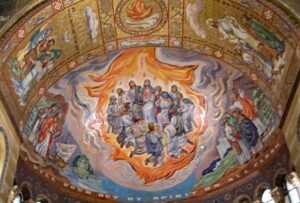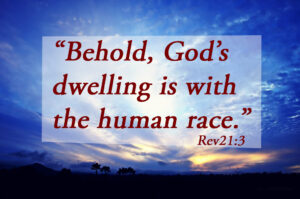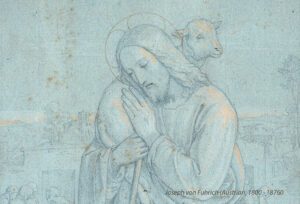Two thoughts were going through my head as I tried to put together a website Post for this weekend. First, Holy Week and Easter are over for this year or are they? The Church wisely encourages us to remain Easter-focused through Pentecost, which is not until June 4. For you and me, was it the Best Lent Ever? If so, we should be closer to being the “best versions of ourselves.” How successful were we at that? Or more precisely, how successful were we at allowing God to help us with being better versions of ourselves? You do know that life is really all about building that relationship with God and that this is what saves us from being stuck as just mediocre versions of ourselves?
Secondly, what do our website visitors and our weekly Mary Garden readers need to hear on this Second Sunday of Easter, which in 2000 Pope John Paul II designated as Divine Mercy Sunday? And why now – on the Sunday after Easter?
Then I saw the movie Manchester by the Sea which put these two themes into focus. Rather watching the movie put into focus what happens when we don’t take time to make the Easter event and divine mercy integral parts of our lives.
Did you notice the name of the movie’s lead character’s church was Sacred Heart Church? That’s as in the Sacred Heart of Jesus, the source of Divine Mercy. Manchester’s lead character, Lee, is a nice guy, drifting through life. He sees and enjoys the people in his world, he puts up with whatever happens to him; he just about gets by, and he doesn’t seem to put much into being the “best version of himself” or of letting God help him to become a better version of himself.
Then tragedy strikes and, in Lee’s own words, years after the tragedy, he “can’t beat it.” (More correctly: tragedy happened as a result of Lee’s years of not paying much attention to the Divine Love and Mercy God has been showering on him since before his birth.) The Manchester By the Sea story line is that Lee makes some pleasure of the moment decisions that lead to his three children dying in a house fire and his never being able to forgive himself for making those decisions, despite numerous attempts of the police, friends and family to tell him that the fire and the deaths were not his fault.
Compare Lee after the death of his children to the Apostles after Jesus’ death. Of course, like Lee, they blamed themselves for what they did and didn’t do to keep Jesus from His humiliating and tragic death. They, like Lee, were in the fear, seclusion, disillusionment, self-disgust and disbelief of mere existence – an existence deprived of awareness of one’s relationship to God. Then in the most profound act of divine intervention Love and Mercy appeared before them. The message for them and for us: Nothing we do or fail to do will cut us off from connection with the source of all goodness and love – unless we let it happen by our inattentiveness and/or refusal to believe. And even that doesn’t cut us off. It just keeps us from experiencing the peace that comes from resting in the assurance of God’s presence to us and never ending love for us.
Even after an apostle, Thomas, expressed his doubt, Jesus doesn’t write him off. He comes back. He give Thomas another chance – and Thomas, overwhelmed and awed, accepts.
Christ does that with all of us and He surely would have been there for Lee, had Lee been able to turn to Him. What held Lee back? I expect it was that, even if he went to church on Easter or on every Sunday, he was simply going through the motions of loving God rather than letting himself experience God’s loving mercy toward him.
Let us continue our Easter season in joy and openness to relating to the people in our lives, the most important of whom is our Risen Lord. For as Leslie Tomlinson, Bishop of Sandhurst, Austrailia said in his 2015 Divine Mercy Sunday homily:
“When we least expect it, Jesus will break through the locked doors of our human hearts. He will find us, in our fear and uncertainty. He understands our misgivings, our hurts, our infirmities and weaknesses. He knows only too well the human condition. As Thomas discovered, he wants to give us another opportunity.
That, too, is part of the message of this Divine Mercy Sunday, when we embrace the power and beauty of God’s forgiveness. It is to remind ourselves of God’s tender mercies.
It is a time for fulfilling the promise of the Resurrection, the glorious hope of Easter. Jesus’ response to Thomas, after he recognized Him as ‘My Lord and my God’, has a mysterious fascination that must relate not so much to the disciples—those who ‘have seen’—but rather to those, like us, who were added to their number afterwards. ‘Blessed are those who have not seen and have believed.’ (Jn 20:29)
Like Thomas, Christ calls us to live our lives so that the witness that we give proclaims His Resurrection. Our lives must show that we have met the Risen One and we recognize Him! Let us pray to be open to God’s tender mercies — that we might say with the joy of Easter discovery, and with the wonder of Thomas: ‘My Lord and my God.’”
Sister Loretta Fernandez RSM




